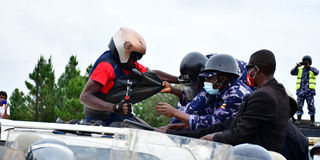Prime
UCC, security tasked on media guidelines

Police arrest Saif-llah Ashraf Kasirye, a journalist with Radio One, in Luuka District last Wednesday. Broadcasters say security agencies are flouting electoral guidelines when handling journalists. PHOTO/FILE
What you need to know:
Broadcasters say some of the UCC guidelines are extreme and call for continued engagement.
The National Association of Broadcasters (NAB) has tasked the Uganda Communications Commission (UCC) and security agencies to exercise caution and wisdom in the interpretation and implementation of the election guidelines so as to ensure a smooth hybrid exercise.
Mr Kin Kariisa, the chairperson of NAB, said regardless of having engaged with the UCC during the formulation of the guidelines, some are extreme, and called for continued engagement.
“When you talk of fairness, what exactly do you mean? We have 11 presidential candidates and media houses may not have the resources, given the hit by the Covid-19 pandemic, to cover all the candidates daily…if you are to revoke licences, they will be many. The implementation should be done with a lot of judgement and wisdom,” Mr Kariisa said.
He was addressing journalists yesterday on the guidelines on the use of media during the electoral period. In the electoral roadmap, the Electoral Commission indicated that campaigns would be conducted mainly through the media, as opposed to the usual open air campaigns to avoid spreading coronavirus.
The guidelines issued by UCC address issues of fair and equal coverage for candidates, advertising and talk show costs, among others. Under the guidelines, broadcasters are required to charge the lowest unit of talk time, issue a commitment form, including the do’s and don’ts for interview and talk show guests to be signed before going on air.
But Mr Abdul Salam Waiswa, the head of legal and compliance at UCC, said the guidelines were reached after engagement with the Electoral Commission, NAB, the media Council and independent media houses.
Mr Waiswa cautioned journalists to ensure they verify every information and allegations made by political players to avoid fake news and misinformation.
“News can change perception and should be arranged in a fair way, and all players should be covered… Whatever you are broadcasting should not glorify violence, or portray violence as good...,” he said.
UCC was also tasked to explain the interference by resident district commissioners and other security agencies where they have at times blocked candidates from radios. However, Mr Ibrahim Bbosa, the head of public relations at UCC, said they have not received any such complaint.
Security of Journalists
Journalists on the campaign trail have often fallen victim to the wrath of security agencies in form of teargas and beatings in times of conflict between security and Opposition politicians.
“Some of our journalists have been traumatised by political activists and sometimes by the security agencies. We need to make sure as the journalists do their work they are secure and protected and you need to communicate to all security agencies,” Mr Kariisa said.
Mr Fred Enanga, the police spokesperson, however, accused journalists of not interrogating the politicians that get in trouble with security but simply castigate the latter for being high handed. “Journalists are not brave enough to put tough questions to the people they cover. It is better to interrogate them , tell them where they are going wrong like it is happening these days where you find that after having being taken clearly through the guidelines of the EC, the SOPs , there is continuous blatant disregard for some of these guidelines but you don’t look to that side, instead you castigate security,” Mr Enanga said.
He added they are willing to offer protective cover for journalists and warned them against being embedded with demonstrators.
Mr Kariisa said a committee consisting of representatives from NAB, security agencies, and UCC to arbitrate grievances by the media has been put in place and will be sitting weekly.
UCC guidelines
Under the UCC guidelines, broadcasters are required to charge the lowest unit of talk time, issue a commitment form, including the do’s and don’ts for interview and talk show guests to be signed before going on air.




